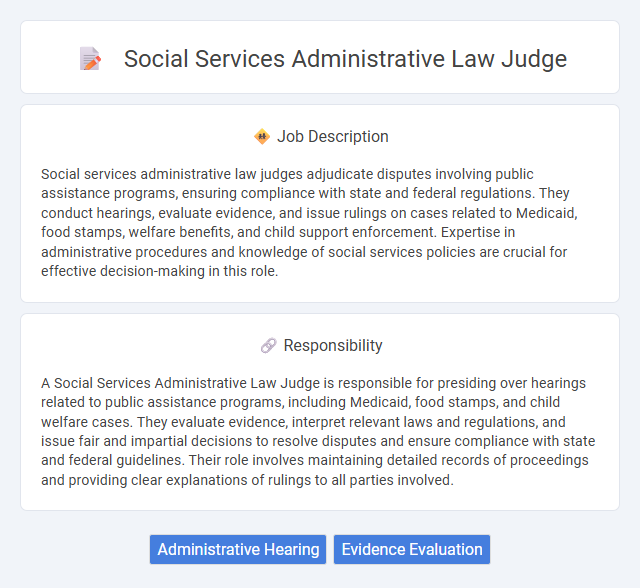
Social services administrative law judges adjudicate disputes involving public assistance programs, ensuring compliance with state and federal regulations. They conduct hearings, evaluate evidence, and issue rulings on cases related to Medicaid, food stamps, welfare benefits, and child support enforcement. Expertise in administrative procedures and knowledge of social services policies are crucial for effective decision-making in this role.
Individuals who are detail-oriented, fair-minded, and possess strong analytical skills are likely suitable for the role of a Social Services Administrative Law Judge. Those with the ability to remain impartial under pressure and a willingness to thoroughly evaluate evidence may find the job aligns with their strengths. People who struggle with bias or have difficulty managing complex legal procedures might face challenges in this position.
Qualification
Social services administrative law judges typically require a juris doctor (JD) degree from an accredited law school and must be licensed to practice law in their jurisdiction. Extensive knowledge of social services regulations, administrative law, and courtroom procedures is essential for effective case adjudication. Strong analytical, decision-making, and communication skills are also critical to ensuring fair and impartial hearings.
Responsibility
A Social Services Administrative Law Judge is responsible for presiding over hearings related to public assistance programs, including Medicaid, food stamps, and child welfare cases. They evaluate evidence, interpret relevant laws and regulations, and issue fair and impartial decisions to resolve disputes and ensure compliance with state and federal guidelines. Their role involves maintaining detailed records of proceedings and providing clear explanations of rulings to all parties involved.
Benefit
Social services administrative law judge positions likely offer significant benefits such as a stable salary, comprehensive health insurance, and retirement plans. Candidates may experience opportunities for professional development and job security within government agencies. There is a probable advantage in gaining specialized expertise in social services policies and dispute resolution.
Challenge
The role of a Social Services Administrative Law Judge likely involves navigating complex regulations and making impartial decisions that affect vulnerable populations. Challenges may include managing high caseloads while ensuring thorough and fair hearings under tight time constraints. Balancing legal requirements with the social impact of rulings probably demands sharp analytical skills and emotional resilience.
Career Advancement
A Social Services Administrative Law Judge plays a crucial role in adjudicating disputes related to social welfare programs, ensuring fair treatment of beneficiaries under administrative law. Career advancement in this field often involves gaining specialized expertise in social welfare regulations, developing strong decision-writing skills, and pursuing certifications such as the National Association of Administrative Law Judiciary credentials. Opportunities for promotion typically include roles like Chief Administrative Law Judge or moving into policy advisory positions within social services agencies.
Key Terms
Administrative Hearing
Administrative Hearing in the role of a Social Services Administrative Law Judge involves presiding over disputes related to public assistance programs, child welfare cases, and eligibility determinations. The judge evaluates evidence, applies relevant laws, and ensures fair and impartial hearings to resolve conflicts between government agencies and applicants or beneficiaries. Expertise in administrative procedures and social services regulations is essential for delivering legally sound and equitable decisions.
Evidence Evaluation
Social Services Administrative Law Judges specialize in evaluating evidence related to welfare, disability, and public assistance cases to ensure fair adjudication. They analyze documents, testimonies, and expert reports, applying legal standards to determine the credibility and relevance of evidence presented. Their objective assessment supports just decisions in compliance with regulatory frameworks governing social services.
 kuljobs.com
kuljobs.com